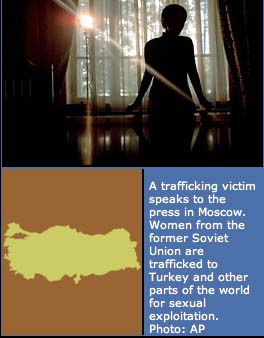A destination and transit country for trafficked women from countries of the former Soviet Union.
Type: Destination and Transit Country
Background
As a bridge between Europe and Asia, Turkey is both a destination and transit country for victims of human trafficking. Geographically, the majority of Turkey is located on the Anatolian peninsula. With more than 5,000 miles of coastline, countless inlets and obscure landing docks facilitate illegal entry to the country, where many hope to find their way to Western countries such as Italy and Germany. Most of the victims in Turkey are found in the cities of Istanbul, Izmir, and Trabzon, where they are trafficked for sexual exploitation and domestic service. The police are the most active governmental agency in terms of addressing Turkey’s trafficking issues, but there are widespread allegations of police corruption, including bribes extended to officials by traffickers. Russian and Ukrainian organized crime groups are cited as the main traffickers in Turkey, but there are also reports of collaboration between Turkish gangs and Chinese snakeheads.
Victims
Some 250,000 people have been trafficked through Turkey since 1999, according to the International Organization for Migration. Most of Turkey’s human trafficking victims are women and girls from various states of the former Soviet Union, including Azerbaijan, Georgia, Armenia, Russia, Ukraine, Uzbekistan, and Moldova. Women may also be trafficked from Romania, Africa, the Middle East, and the former Yugoslavia. There are reports of girls being kidnapped and trafficked from orphanages in Romania, but most leave their homelands voluntarily, under the belief that they are headed for work as waitresses, models, dancers, or housekeepers. Girls may be trafficked as far away as Southeast Asia for work in the sex trade. Those who resist their captors may be beaten, raped, or murdered. Many are forced to sign work contracts that result in debt bondage. According to a recent report by Johns Hopkins University’s Protection Project, there may be as many as 200 human smuggling organizations operating in Turkey.
Counter-Trafficking Efforts
The 2003 U.S. Trafficking in Persons report places Turkey in the bottom tier of countries — a ranking that could place the country at risk for losing its non-humanitarian financial aid. Areas for improvement, according to the report, include prevention of trafficking and protection of trafficking victims. Turkey does not have a system for separating illegal immigrants from trafficking victims. Standard practice involves deporting both. Most of the trafficking victims are usually tracked down by gangs and retrafficked back into Turkey. However, according to Turkey’s Ministry of the Interior, seven foreign trafficking victims were recently issued humanitarian visas that allowed them one month of temporary residence.
The results are mixed for Turkey’s record on anti-trafficking legislation and public awareness campaigns. Prostitution is legal in Turkey, but within the last year the government amended its criminal code to prohibit trafficking in persons. Forced labor is also illegal under the country’s constitution. While there have been no official anti-trafficking education campaigns, in 1999 Turkish police cooperated with groups from Ukraine and Moldova on educational films meant to discourage Moldovan and Ukrainian women and girls from going to Turkey.
- Previous: Thailand
- Next: United Arab Emirates



